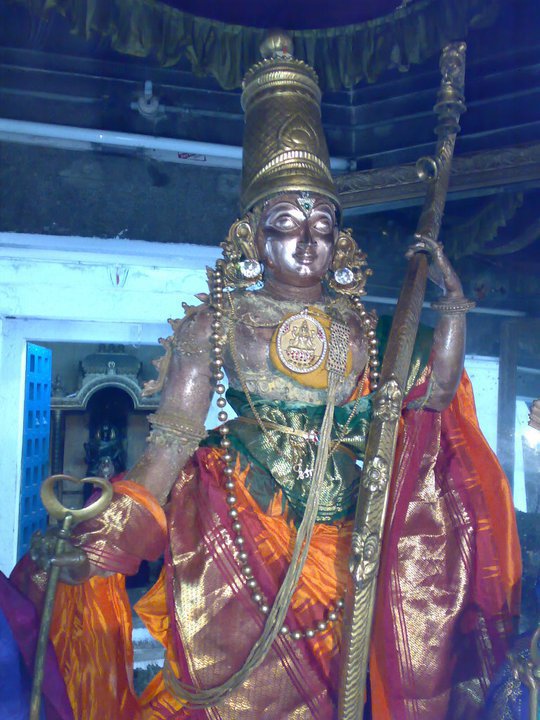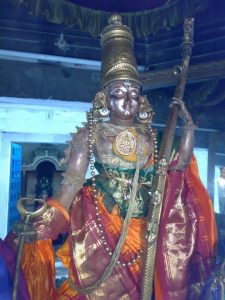Rama Raksha Strotra in Padma Puranam
Preamble
In the previous article ( http://anudinam.org/2012/08/05/sri-vishnusahasranama-in-the-padma-puranam ), we had a peep into Sri Vishnusahasranama found in the Uttarakhanda of the Padma Purana. We came to know of the glories of Lord Vishnu, His greatness as the Creator and Sustainer of the universe and His being the Consort of Goddess Sri. Parvati declares in no uncertain terms that, only He who has Goddess Lakshmi as His Consort is the essence of all worldly existence and the sole Leader of the entire universe (sa cha samsaara saaraikah sarvalokaika naayakah). He is full of purity, beauty, wealth, uprightness and valour surpassing all; there is none who can equal Vishnu, the God of all gods.. Having realised His excellences, Parvati wants to know the easiest way to recite the thousand Names and Siva spells the Rama-nama and its greatness.
Merits of the Names
It is customary to end any stotra with the phalasruti or merits accrued by reciting that stotra. This encourages people to recite the stotra and acts as an incentive for earning merits. Hence it is that Siva goes on to state the merits derived by reciting the thousand Names before enunciating the Ramaraksha-stotra. He states that people of all four castes attain the highest Abode of Vishnu by reciting these Names. Though it is impossible to list the merits as they are beyond enumeration, he declares that recitation of these Names gives the highest bliss (param nirvaana daayakam). All places become sacred wherever this is recited. These pure Names should be called to mind with hearts full of devotion and with the awareness that one is the servant of the Lord. Those wise men who utter these will be free from all sins and attain the proximity of Vishnu.
idampavitram paramam bhaktaanaam vallabham sadaa,
dhyeyam hi daasabhaavena bhaktibhaavena chetasaa.
param sahasranaamaakhyam ye pathanti maneeshinaly,
sarvapaapavinirmuktaah te yaanti harisannidhau.
Prologue to the Ramaraksha-stotra
The introduction to this short but potent stotra glorifies Lord Vishnu once again. Siva asks Parvati to listen to the greatness of Kesava and states that the great souls who listen to it are meritorious and become the very nature of merit.
sRunu devi pravakshyaami maahaatmyam kesavasya tu,
ye sRunvanti narasreshthaah te punyaah punyaroopinah.
Hence it follows that Vishnu (Kesava) and Rama are one and the same and recitation of the Rama-nama is actually glorification of Vishnu. Here each Name is meditated upon to protect a particular limb of the reciter and thus the whole stotra forms a protective shield to the body and mind. It is capable of repelling all evil and housing only what is good for the one who calls to mind this stotra. Such is its efficacy.
The Ramaraksha stotra is as follows:
Mahadeva is the poet, The great sage Visvamitra is the seer of this hymn. Sri Rama is the deity. The metre is anushtup and it is recited for the purpose of pleasing Lord Vishnu. One has to meditate on the immutable lotus-eyed Lord Rama draped in yellow raiment and resembling the atasi flower.
Sri Ramaraksha-stotra
अतसी पुष्पसंकाशं पीतवाससमच्यु तम्,
ध्यात्वा वै पुंडरीकाक्षं श्रीरामं विष्णुमव्ययम्.(१)
पातुवो हृदयं रामः श्रीकंठः कंठमेव च,
नाभिं पातु मखत्राता कटिंमे विश्वरक्षकः. (२)
करौ पातु दाशरथिः पादौ मे विश्वरूपधृक्,
चक्षुषी पातु वै देव सीतापतिरनुत्तमः. (३)
शिखां मे पातु विश्वात्मा कर्णौ मे पातु कामदः,
पार्श्वयोस्तु सुरत्राता कालकोटि दुरासदः. (४)
अनंतः सर्वदा पातु शरीरं विश्वनायकः,
जिह्वां मे पातु पापघ्नो लोकशिक्षाप्रवर्त्तकः. (५)
राघवः पातु मे दन्तान् केशान् रक्षतु केशवः,
सक्थिनी पातु मे दत्तविजयोनाम विश्वसृक्. (६)
एतां रामबलोपेतां रक्षां यो वैपुमान् पठेत्,
स चिरायुः सुखी विद्वान् लभते दिव्यसंपदाम्. (७)
रक्षाम् करोति भूतेभ्यः सदा रक्षतु वैष्णवी,
रामेति रामभद्रेति रामचन्द्रेति यः स्मरेत्. (८)
विमुक्तः स नरः पापान् मुक्तिं प्राप्नोति शाश्वतीम्,
वसिष्ठेन इदं प्रोक्तं गुरवे विष्णुरूपिणे, (९)
ततो मे ब्रह्मणः प्राप्तं मयोक्तं नारदं प्रति,
नारदेन तु भूर्लोके प्रापितं सुजनेष्विह. (१०)
सुप्त्वा वाऽथ गृहेवापि मार्गे गच्छेत एव वा,
ये पठन्ति नरश्रेष्ठः ते नराः पुण्यभागिनः. (११)
atasee puShpasaMkaashaM peetavaasasamachyu tam,
dhyaatvaa vai puMDareekaakShaM SreeraamaM viShnumavyayam. (1)
paatuvo hRudayaM raamaH SreekaMThaH kaMThameva cha,
naabhiM paatu maKatraataa kaTiMme viSvarakShakaH. (2)
karau paatu daaSarathiH paadau me viSvaroopadhRuk,
chakShuShee paatu vai deva seetaapatiranuttamaH. (3)
SikhaaM me paatu viSvaatmaa karNau me paatu kaamadaH,
paarSvayostu suratraataa kaalakoTi duraasadaH. (4)
anaMtaH sarvadaa paatu SareeraM viSvanaayakaH,
jihvaaM me paatu paapaghno lokaSikShaapravarttakaH. (5)
raaghavaH paatu me dantaan keSaan rakShatu keSavaH,
sakthinee paatu me dattavijayonaama viSvasRuk. (6)
etaaM raamabalopetaaM rakShaaM yo vaipumaan paThet,
sa chiraayuH sukhee vidvaan labhate divyasaMpadaam. (7)
rakShaam karoti bhootebhyaH sadaa rakShatu vaiShNavee,
raameti raamaBadreti raamachandreti yaH smaret. (8)
vimuktaH sa naraH paapaan muktiM praapnoti SaaSvateem,
vasiShThena idaM proktaM gurave viShNuroopiNe, (9)
tato me brahmaNaH praaptaM mayoktaM naaradaM prati,
naaradena tu bhoorloke praapitaM sujaneShviha. (10)
suptvaa vaa&tha gRuhevaapi maarge gacCheta eva vaa,
ye paThanti naraSreShThaH te naraaH puNyabhaaginaH. (11)
The protective Rama Stotra
‘May Rama protect my heart. May Srikantha protect my throat. May the Protector of the sacrifice protect my navel. May the Protector of the universe protect my waist. May Dasaratha’s Son protect my hands. May He of a universal form protect my feet. May the matchless Lord of Sita protect my eyes. May the universal Soul protect my tuft of hair. May the One who grants the desired objects protect my ears. May the Protector of the gods take care of my sides. May He who is beyond death (and hence inaccessible to multitudes of deaths), the eternal Master of the universe, protect my body. May my tongue be protected by the Destroyer of sins and the Propagator of teaching to the entire world. May Raghava protect my teeth and may Kesava protect my hair. May the Creator of the universe, called Dattavijaya protect my thighs.’ This stotra, charged with Rama’s power, will grant long life, happiness, learning and divine prosperity to those who chant it. This raksha, which is sacred to Vishnu, always protects one and all. One who remembers Rama, Ramabhadra and Ramachandra is free from sins and attains eternal salvation. This stotra was imparted to the preceptor in the form of Vishnu. Then from Brahma it came to Siva who passed it on to Narada who in turn propagated it to the sages on earth. The great souls who chant this are benefited vastly. Thus concludes this wonderful raksha.










Very good Stotram.
please use the link for the tamil PDF version
http://www.vignanam.org/veda/lyrics/Rama_Raksha_Stotram_Tamil.pdf
Srikanth swamin, thank you for the link. the link you had given is the rama raksha stotram written by sage budha kaushika, one which mentioned in article is in padma puranam, by shiva to meditate lords name upon to protect a particular limb of our body. both are different versions swamin.
Thanks for pointing out this.
Thankyou for a very wonderful slokam on Sri Rama. Can you pls provide the tamil version with numbered consonants so that it is easy for us to read and understand. Thanks.
make the slokam in tamil version very useful many persons